In a recent interview with HIV Equal, former child star Danny Pintauro said he wants to be “an example of what not to do and what not to be, and what happens when you go down even the slightest of dark roads. The darker the road, the bigger the problems.”
He then told interviewer Stephen Lucin how his meth addiction began: “So here I am wanting to explore bondage, wanting to explore rougher things, wanting to explore, sort of, being dominated. And the person that I find, who I think is just gorgeous, and oh my god, it’s like, perfect. This guy wants to hang out with me? How can I turn him down? And then I get over there, and he’s like, ‘Well you should try this.’”
Everyone who has struggled and is struggling with meth addiction has a story, and this is Pintauro’s story. But surely he is not saying that “the rougher things” — BDSM (bondage, domination, sadism, and masochism) — are a “dark road” that leads to big problems like drug addiction?
I’m giving Pintauro the benefit of the doubt here, because I think he is trying to deliver a good message, one of HIV education and the reality of widespread meth addiciton in the gay community (even if some of his statements about how he contracted the virus are a bit suspect).
But there is still a widespread misconception of bondage and BDSM — thanks in part to E. L. James’ cringe-worthy Fifty Shades of Grey franchise — so Pintauro’s statements run the risk perpetuating the idea that kinky people (the people who enjoy getting dominated, and the people who enjoy dominating them) are all depraved drug users, and not to be trusted.
In my experience, the very opposite is true. It would be silly to say that kinky people everywhere don't do drugs, because of course some do. But BDSM is not implicitly a bad road that leads to problems.
For me and many others, BDSM was a liberating journey that led to very good things like healthier self-expression, inclusion in a tight-knit community that tends to be very body-positive, an improved self-image, better communication skills, and increased acceptance of others.
Here’s my story: When I was a freshman in college, I knew very little about BDSM. I had seen pictures of guys in leather but I didn't know what it meant, and I had seen porn of guys getting tied up. I only knew that I was terrified of it, because deep down, it excited me. The idea of getting tied up seemed dangerous, and its illicit allure only fortified my belief that it was somehow “wrong.”
When I finally started to explore that side of myself, I discovered that most people into kink and BDSM — most, not all — were kind, healthy people who led very traditional lives. They just happened to have sex lives that differed from what I considered “the norm.”
Faced with the task of communicating interests and desires that are often misunderstood, the kinky people I met at the beginning of my journey were excellent communicators.
One of them became my Sir. He was a dominant guy who, after meeting me at a nearby Mexican restaurant a couple times to talk about what I was interested in, tied me up in his spare bedroom and paddled my ass. We continued meeting, and over time he tested my limits with corporal pain. He gradually introduced to me to other kinks: roleplay, pet play, assplay. As I grew, our interests gradually changed, and we stopped having sex. Today I consider him my closest friend.
I have become a kinkster, and like those kinksters I first met, I have learned how to communicate my interests and desires clearly and effectively. Accepting this side of myself has caused me to accept all parts of myself, and accept others who are different from me. If I enjoy acting like a dog and playing fetch with a handler, who am I to judge if someone likes to drink piss, wear head-to-toe rubber, or get gang-banged in the back of a club? I know my sexual interests might be considered silly or extreme to some. Becoming proud and public about them has made me a kinder and more confident person.
I think Pintauro would agree that the people you have around you are incredibly important, especially if you’re struggling with drug addiction. I believe the worst thing you can do to someone who is struggling with something is shame them for it, and shame is not part of kink culture.
We are comfortable talking about the complexities of the body, because we do every time we play with someone new. As a result, there are countless leathermen, fisters, fistees, rubber fetishists, dominatrixes, submissives, masters, slaves, ponies, pups, and pigs out there whose fetishes force them to see the ugly side of addiction with understanding, honesty, and activism.
Again, I don’t think Pintauro meant to link BDSM with addiction. I think he simply told his story exactly as it happened: he met a dominant, kinky guy who introduced him to a drug that many people — kinky and vanilla alike — use for sex, but at a life-altering cost.
Telling his story requires bravery, and can shine a light on the problem of meth addiction in the gay community. But it needn’t simultaneously cast BDSM in a dark shadow. Far from being a community that is not be trusted, kinksters are more likely to help, not hurt.
Watch the interview below.












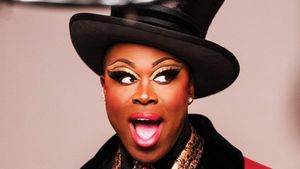


















































 But, even keep-a-cardboard-cutout-of-my-ex-gilfriend-next-to-a-creepy-shrine-Alice wasn’t neurotic enough to chart the sexual escapades of queer women in early twentieth century Europe, so instead the responsibility has fallen on my lit-gossip-obsessed shoulders. And I have to say, Alice was totally missing out.
But, even keep-a-cardboard-cutout-of-my-ex-gilfriend-next-to-a-creepy-shrine-Alice wasn’t neurotic enough to chart the sexual escapades of queer women in early twentieth century Europe, so instead the responsibility has fallen on my lit-gossip-obsessed shoulders. And I have to say, Alice was totally missing out.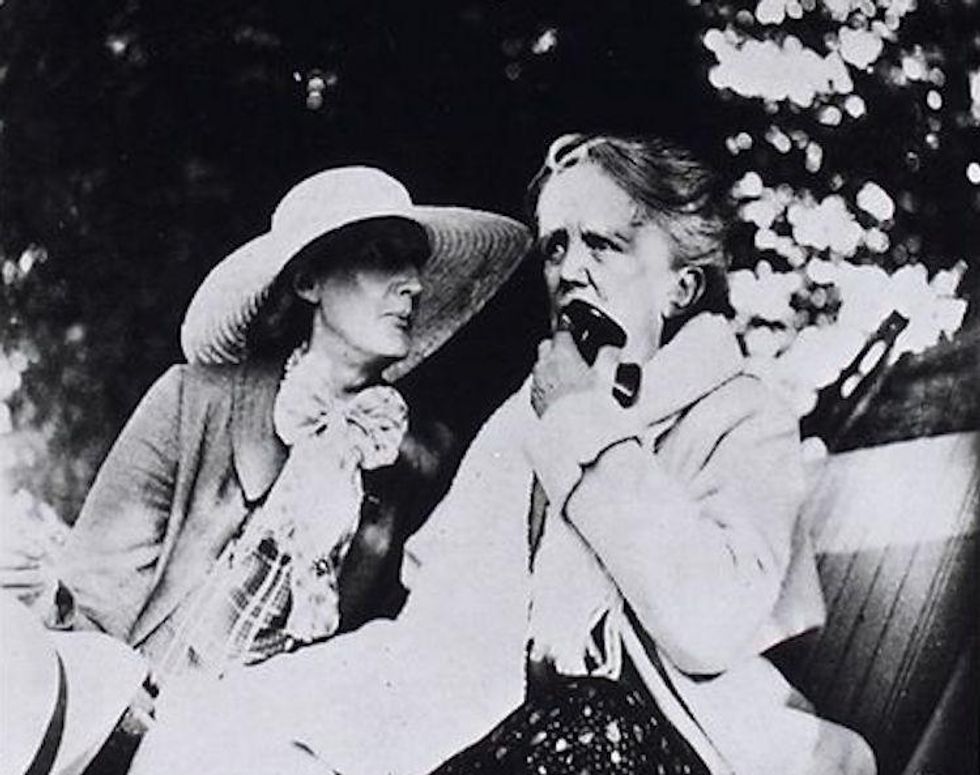 Woolf and Ethel Smyth, Henry W. and Albert A. Berg Collection, The New York Public Library.
Woolf and Ethel Smyth, Henry W. and Albert A. Berg Collection, The New York Public Library. We choose who we sleep with, but we don’t always choose whether or not we’re connected to people. Woolf and Smyth are connected, just not in the way Smyth would’ve liked. Here’s the breakdown of Virginia Woolf’s connection to Ethel Smyth:
We choose who we sleep with, but we don’t always choose whether or not we’re connected to people. Woolf and Smyth are connected, just not in the way Smyth would’ve liked. Here’s the breakdown of Virginia Woolf’s connection to Ethel Smyth:
 Leonard and Virginia Woolf during their engagement c. 1912.
Leonard and Virginia Woolf during their engagement c. 1912. 
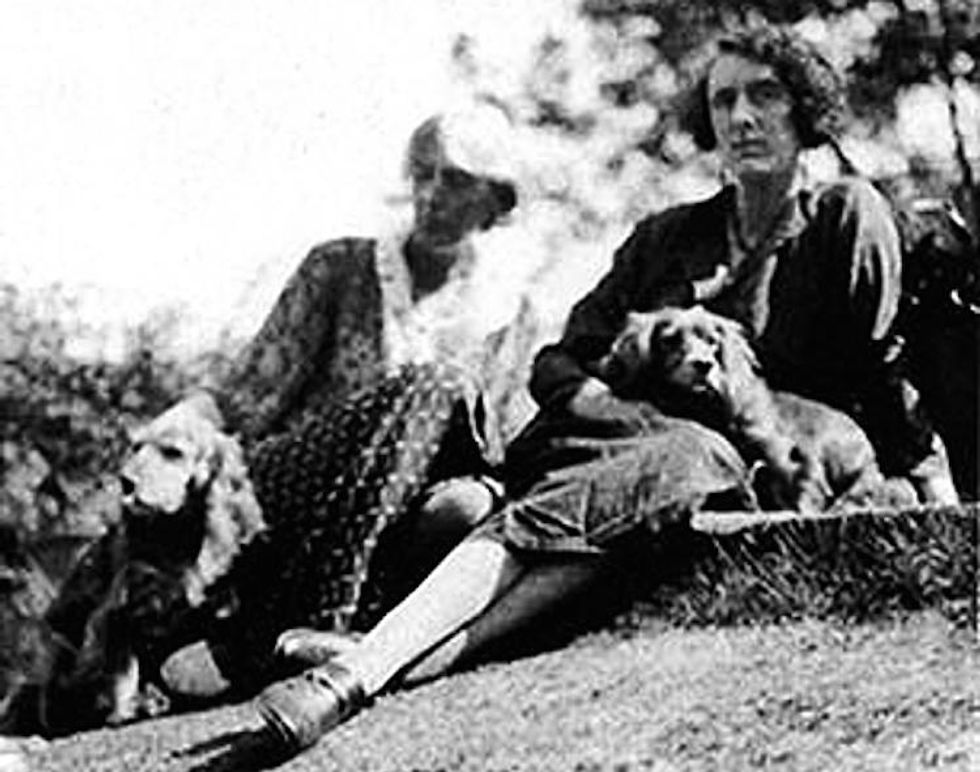 Virginia and Vita at Monk's House, 1933, photographed by Leonard Woolf.
Virginia and Vita at Monk's House, 1933, photographed by Leonard Woolf.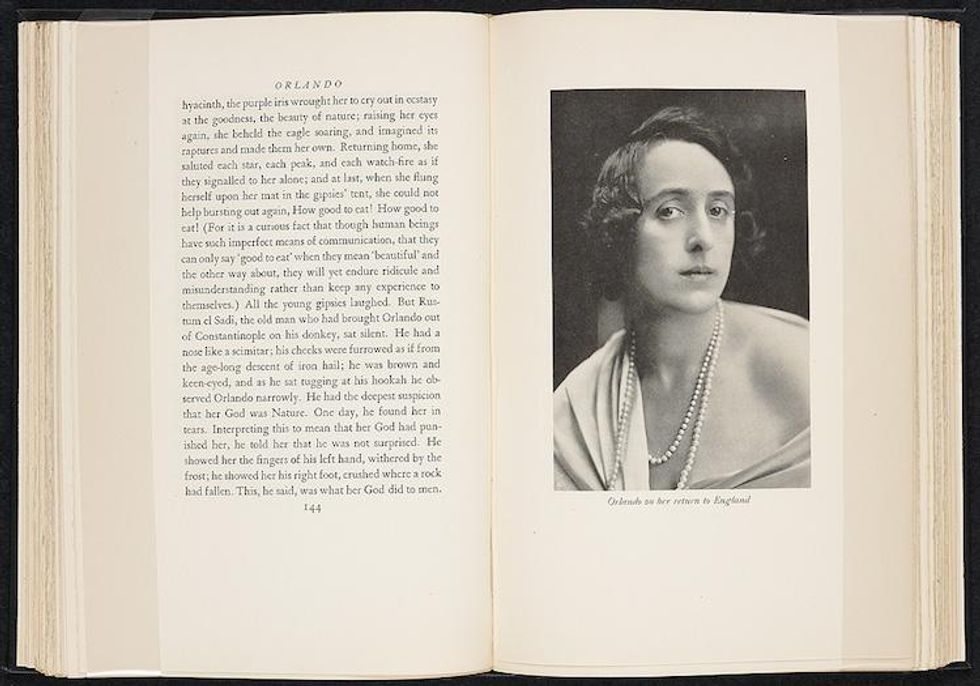 Orlando: A Biography. New York: Crosby Gaige, 1928. Vita Sackville-West pictured as Orlando.
Orlando: A Biography. New York: Crosby Gaige, 1928. Vita Sackville-West pictured as Orlando.
 Violet Trefusis c. 1920.
Violet Trefusis c. 1920. While Violet’s relationship with Vita was probably the most formative relationship of her life, she also had a relationship with Winnaretta Singer—musical patron, heiress to the Singer sewing machine fortune, and Princess Edmond de Polignac—from 1923 to 1933.
While Violet’s relationship with Vita was probably the most formative relationship of her life, she also had a relationship with Winnaretta Singer—musical patron, heiress to the Singer sewing machine fortune, and Princess Edmond de Polignac—from 1923 to 1933. Winnaretta Singer via Foundation Singer-Polignac.
Winnaretta Singer via Foundation Singer-Polignac.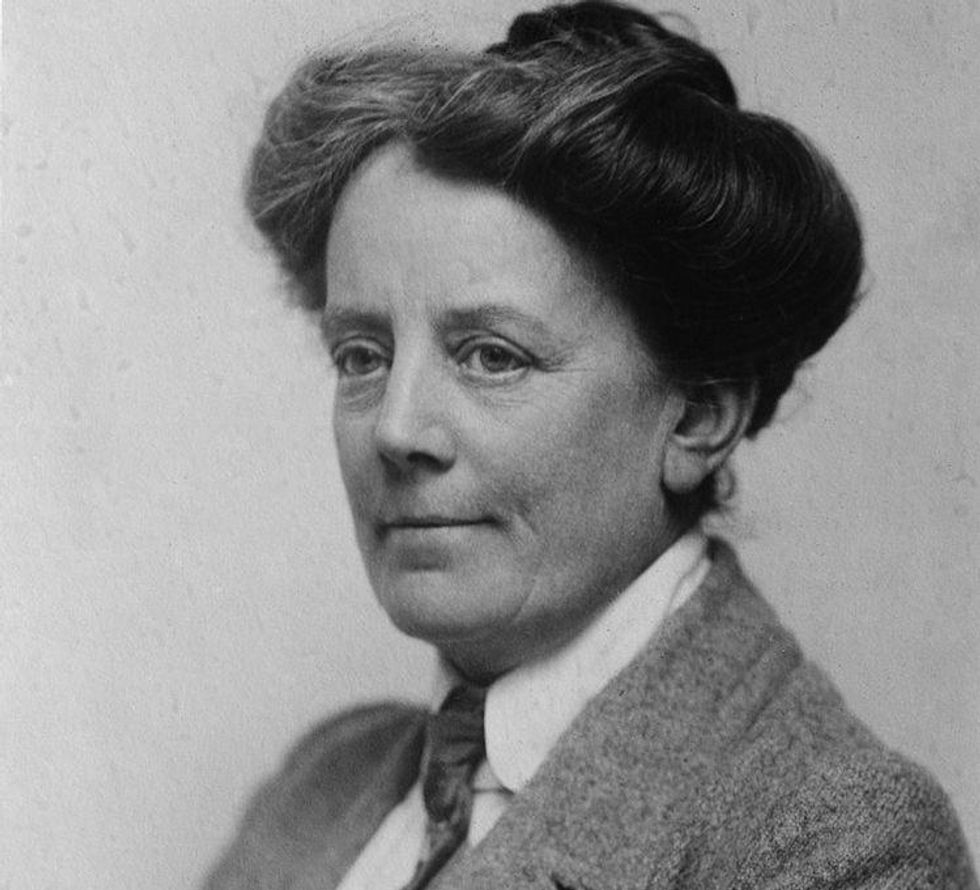 Ethel Smyth from the United States Library of Congress Prints and Photographs.
Ethel Smyth from the United States Library of Congress Prints and Photographs.